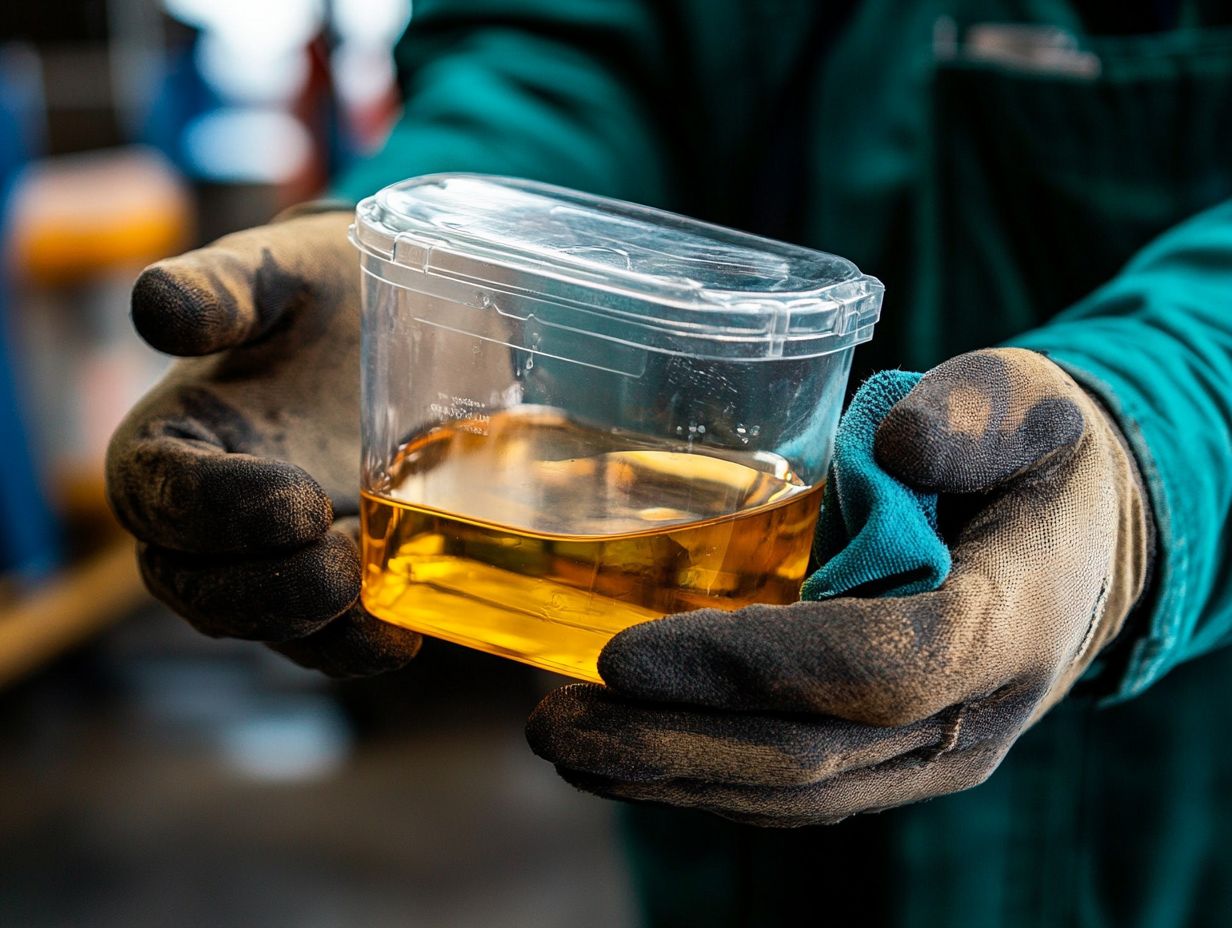The Basics of Brake Fluid Maintenance
Brake fluid is an essential element of your vehicle s braking system, providing the safe and efficient stopping power you rely on. Grasping its definition, purpose, and maintenance is vital for every driver. This guide delves into the importance of maintaining brake fluid, the various types available, and the steps to check and replace it when necessary. You ll also discover practical maintenance tips to ensure your brakes perform at their best. Equip yourself with the knowledge of brake fluid to stay safe on the road!
Contents
- Key Takeaways:
- What is Brake Fluid?
- Why is Brake Fluid Maintenance Important?
- Types of Brake Fluid
- How to Check Brake Fluid Levels
- When to Replace Brake Fluid
- Brake Fluid Maintenance Tips
- Frequently Asked Questions
- What is brake fluid and why is it important for maintenance?
- How often should brake fluid be checked and replaced?
- What are some signs that indicate it’s time to replace the brake fluid?
- Can I use any type of brake fluid for my vehicle?
- Can I check and replace brake fluid myself or should I go to a mechanic?
- What Happens If I Neglect Brake Fluid Maintenance?
Key Takeaways:

- Regular brake fluid maintenance is crucial for safe and efficient driving. Neglecting it can lead to serious consequences such as brake failure and costly repairs.
- Understanding the different types of brake fluid and their formulas is essential for choosing the right one for your vehicle and ensuring optimal performance.
- Checking brake fluid levels regularly and replacing it when necessary is key to maintaining the integrity of your vehicle’s braking system and ensuring your safety on the road.
What is Brake Fluid?
Brake fluid is a vital hydraulic fluid in your vehicle, helping your brakes work by transferring pressure from the brake pedal to the braking system. It operates on Pascal’s law, meaning that the pressure you apply to the brake pedal is transferred seamlessly to the brake components.
This mechanism guarantees consistent brake performance, regardless of the driving conditions you encounter. Understanding the importance of brake fluid is crucial for maintaining your vehicle’s safety; it directly influences brake efficiency and can lead to issues like brake fade or failure if neglected.
Definition and Purpose
Brake fluid is a specialized fluid designed for hydraulic brakes, allowing for the precise transmission of force from the brake pedal to the braking system. This unique fluid, often made from chemicals designed to withstand heat, plays a crucial role in regulating the performance of your braking system, ensuring that safety remains at the forefront during your driving experience.
Its ability to withstand high temperatures and resist moisture absorption is vital; any change in its properties could lead to reduced braking efficiency, potentially jeopardizing the hydraulic systems. Regular checks and timely replacement of brake fluid are essential components of a thorough brake maintenance routine.
By prioritizing these actions, you significantly contribute to maintaining optimal performance, preventing brake fading, and enhancing the overall safety of your vehicle.
Why is Brake Fluid Maintenance Important?
Maintaining your brake fluid is crucial for the safety and performance of your vehicle. Neglecting brake maintenance can put your safety at risk don t wait! Scheduling regular brake fluid flushes and inspections can prevent the risks associated with contaminated fluid and corrosion in the brake system, ensuring that your brakes operate at their best.
Effects of Neglecting Maintenance
Ignoring brake fluid maintenance can lead to serious issues like brake fade, performance degradation, and even catastrophic brake failure, all of which jeopardize your vehicle’s safety. When brake fluid becomes contaminated often from moisture absorption or debris it can cause corrosion in vital components of the braking system.
This corrosion doesn t just affect the metal parts; it can also reduce the overall braking efficiency, making it increasingly difficult for your vehicle to come to a halt when needed. Contaminated fluid can also introduce air into the braking system, further undermining its performance.
Over time, this neglect may lead to longer stopping distances and a noticeable lack of responsiveness. Regular maintenance isn’t just a good idea it’s essential for your safety!
Check your brake fluid today or consult a mechanic to ensure your braking system is in top condition!
Types of Brake Fluid

You ll encounter several types of brake fluid, including DOT 3, DOT 4, DOT 5, and DOT 5.1, each possessing distinct characteristics tailored for different brake systems in your car.
Grasping the nuances of these brake fluid types is essential for maintaining compatibility with your vehicle s brake components.
This understanding maximizes performance across various driving conditions.
Different Formulas and Grades
Different grades of brake fluid, including glycol-based and silicone-based formulas, are carefully made to meet specific performance requirements tailored for various braking systems.
These formulations affect both temperature and moisture absorption; they play a crucial role in determining the overall efficiency and reliability of your brake performance.
Glycol-based fluids, commonly found in most vehicles, boast impressive wet boiling points. However, be aware that they can absorb moisture over time, compromising brake effectiveness.
Silicone-based fluids resist moisture absorption and offer superior longevity. But they might lead to less responsive braking under certain conditions.
Understanding these distinctions gives you the power to make informed decisions about brake performance checks and necessary maintenance, ultimately enhancing both your vehicle’s safety and your overall driving experience.
How to Check Brake Fluid Levels
Checking your brake fluid levels is quick and crucial for your vehicle’s safety! This proactive measure can help prevent serious issues like brake failure or diminished performance.
By routinely inspecting both the appearance and level of the brake fluid, you can catch potential problems early and assess whether a fluid change is warranted.
Step-by-Step Guide
To effectively check your brake fluid levels, begin by locating the brake fluid reservoir, ensuring your vehicle is parked on a level surface. This setup not only guarantees a stable environment for an accurate reading but also enhances safety while you carry out this essential maintenance task.
It s important to don protective gloves and safety goggles, as brake fluid can be corrosive and harmful to your skin and eyes. Once you have your protective gear in place, carefully remove the cap of the reservoir and inspect both the fluid level and its condition.
The fluid should appear clear or light amber; if it s dark or contains debris, that s a clear sign of contamination. Make sure the fluid level sits comfortably between the minimum and maximum lines marked on the reservoir.
Maintaining proper brake fluid levels is critical for optimal brake system performance, so pay close attention to this vital aspect of your vehicle’s upkeep. Regularly reviewing the importance of regular brake maintenance can help ensure your safety on the road.
When to Replace Brake Fluid
Understanding when to replace your brake fluid is essential for maintaining peak brake performance and safeguarding against potential safety issues, like brake fade or failure.
Look out for signs of contamination if the fluid appears dark or has absorbed moisture, it s time for a replacement. Ensuring your vehicle’s braking system remains reliable is not just a matter of convenience; it’s a crucial aspect of vehicle safety.
Signs and Symptoms of Contamination

Brake fluid contamination shows various signs. These include changes in color, a drop in brake efficiency, and a rise in the fluid’s boiling point.
These symptoms indicate issues in your brake system. They also pose serious safety risks by reducing braking power when you need it most. For example, if the fluid looks murky or darker than usual, it could mean that water or dirt has gotten into the system, leading to corrosion in brake components.
As brake fluid becomes contaminated, its effectiveness in transferring force wanes. This makes regular brake maintenance essential.
Keep your brakes performing at their best and extend their lifespan. Regular inspections and quick fluid replacements are key. This way, you can maintain control and prioritize your safety on the road.
Brake Fluid Maintenance Tips
Implementing effective brake fluid maintenance tips is crucial for ensuring the reliability and safety of your vehicle’s braking system. By regularly flushing the brake fluid and adhering to a routine maintenance schedule, you can prevent problems like contaminated fluid and brake system corrosion.
This proactive approach enhances brake efficiency and boosts your overall driving safety.
Best Practices for Optimal Performance
To achieve optimal brake performance, adhere to best practices for brake fluid maintenance. This includes timely fluid replacements and vigilant monitoring of brake performance indicators.
Ensuring that your brake fluid remains at the correct level and is free from contaminants can significantly enhance your overall braking efficiency. Regular inspections should include checks for any signs of fluid discoloration, which may indicate it s time for a change.
Utilizing the recommended type of brake fluid for your specific vehicle be it DOT 3, DOT 4, or DOT 5.1 contributes to superior braking performance. Understanding the importance of flushing the brake system at intervals suggested by the manufacturer is crucial; this practice helps prevent moisture buildup that can lead to brake fade and decreased responsiveness over time.
Frequently Asked Questions
What is brake fluid and why is it important for maintenance?
Brake fluid is a type of hydraulic fluid used in the brake system of a vehicle. It transfers the force from the brake pedal to the brake components, allowing the vehicle to slow down and stop. Maintaining brake fluid ensures the brakes function properly and helps prevent potential accidents.
How often should brake fluid be checked and replaced?

It is recommended to check brake fluid levels every 6 months and replace the fluid every 2 to 3 years. However, this can vary depending on the type of vehicle and driving habits. Consult your vehicle’s manual for specific recommendations.
What are some signs that indicate it’s time to replace the brake fluid?
If you notice a decrease in brake performance, a soft or spongy brake pedal, or if the brake fluid appears dark or dirty, it is likely time to replace the fluid. Don t ignore these signs! Addressing them promptly can prevent costly brake failures.
Can I use any type of brake fluid for my vehicle?
No, it is important to use the type of brake fluid specified in your vehicle’s manual. Different types of brake fluid have varying compositions and can have harmful effects if used in the wrong vehicle. Always consult the manual or a professional mechanic for the correct type.
Can I check and replace brake fluid myself or should I go to a mechanic?
You can check and replace brake fluid yourself, but it s best to consult a mechanic. Brake systems are complex, and mistakes can have serious consequences. A professional mechanic has the necessary tools and experience to properly check and replace the fluid.
What Happens If I Neglect Brake Fluid Maintenance?
Neglecting brake fluid maintenance can lead to serious problems. Over time, moisture and contaminants can build up in the fluid.
This buildup can cause corrosion and damage to brake parts. Don t wait for decreased performance or brake failure regularly check and replace your brake fluid to ensure safe and reliable braking!





